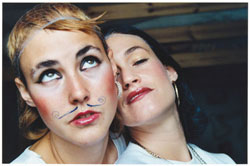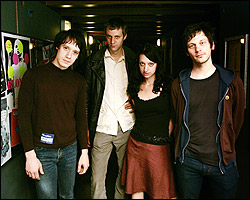Bianca and Sierra Casady grew up the way sisters sometimes do—less friends than foes, more strangers than kin. Eventually, they simply stopped talking to each other. By the time they found one another again as adults in 2003, one was studying opera in France, and the other was exploring fashion design, poetry, and visual art. When they reunited, each immediately gave up her other pursuits and they became one: CocoRosie.
There’s nothing necessarily unique about the fact that Bianca and Sierra didn’t share a closeness growing up, nor that as women, they discovered that they had more common ground between them than not. Lots of brothers and sisters hate each other before they can love each other. It’s part of growing up. What’s unique is that once Bianca and Sierra—nicknamed Coco and Rosie by their mother—came together, they came together fluidly, immediately, and completely. There’s a reason there is no space between the lowercase “o” and the capital “R.” They don’t use personal pronouns; they’re a “we.”
“Yeah, we’re like a married couple,” Bianca tells me in a droll Brooklyn accent. And like a married couple, the story of their union features elements of us-against-the-world romance, forget-everything-you-know innocence, and utterly inescapable, almost incarcerating fate. These same elements color the duo’s music.
The sisters made their first record, last year’s La Maison de Mon Rêve, while holed up in a garret in Paris. After reuniting and allowing their bitter past to “just sort of wash away,” as Bianca puts it, they literally shut the world out, cloistered themselves, and created a new world for themselves. It’s a world that cracks with broken beats, collaged sound effects, tiny pianos, and aching, lush melodies.
“The first record was a snapshot of a bubble,” says Bianca. But to their credit, it’s an alluring bubble that draws you in. Some couples exude exclusivity, but CocoRosie managed to write universally while sequestered and, one can only imagine, totally focused on each other and themselves. “Tahiti Rain Song” uses field recordings to cross continents as a little-girl voice (Bianca’s) sings “Oh, laughter/Oh, laughless/Just sing this/Just mean this/Infinity whispered to me.” The track then gorgeously becomes the next, “Candy Land,” in which Sierra quietly shows off her soprano. Next, on “Butterscotch,” a junior-high-school beat poet’s lament is timed to a rooster’s crow and textured by spare acoustic guitar. “Why does holdin’ hands feel so right?/Got a bruise on my pinky ring from holdin’ too tight,” Bianca gracefully intones. Sierra’s ethereal la la la las are layered over the top—hip-hop as folk music as torch song as toy electronica, insularity as popularity as loneliness as freedom.
COCOROSIE’S latest, Noah’s Ark (Touch & Go), is more of the same—more odd, painterly song murals, more inner urban folk innocence. But the new record is different enough that it’s hard to imagine it being recorded the same way the first was, with the same seclusion and shut-out-the-world ethos. Bianca confirms this.
“Definitely, that is the main difference between the two records,” she says. “Our whole attitude about our lives and our creativity during [the time of this recording] was a lot more open, a lot more social, a lot more interactive. When we came back from Europe, we were feeling very social and very wild. We were hanging out in the streets, and we had a lot of people in our house, and we were just really enjoying the community of people in New York.”
That sense of community—the idea that, as the album’s title jocularly suggests, at least two of every type of beast and beauty in the city conspired to make these songs—is what distinguishes the record. “South 2nd” and “Armageddon” are future-thinking, streetwise jeremiads; “Bare Hides and Buffalo” and “Beautiful Boyz” contrast modern times and modern sounds with ancient laments. Drug users and Martin Luther are made into an unlikely pair on “K-Hole.” Their first record looked inward, the second looks outward. On La Maison, they wrote about their world; on Noah’s Ark, they write about the world.
The sense of community also applies in a more direct manner to the record’s sound; Antony of Antony and the Johnsons (for whom CocoRosie open on Saturday at the Triple Door), Devendra Banhart, and French beatboxer Spleen all provide guest vocals (Banhart’s are in Spanish), varying the texture of the album’s language, lyrics, and location. Sierra sings like Billie Holiday all crumpled up into a ball, Bianca toy-talks like a too-smart child, and their guests smooth out all the wrinkles.
It’s not typically a good thing when an artist is able to be all things to all people, and that’s not exactly what CocoRosie do despite their able, ultramodern style-skirting. Instead, they’re all things to each other—and when they share that with you, you’re made to feel a part of the broken up and patched together family.
CocoRosie play the Triple Door with Antony and the Johnsons at 8 p.m. Sat., Sept. 17. $18 adv./$20.








